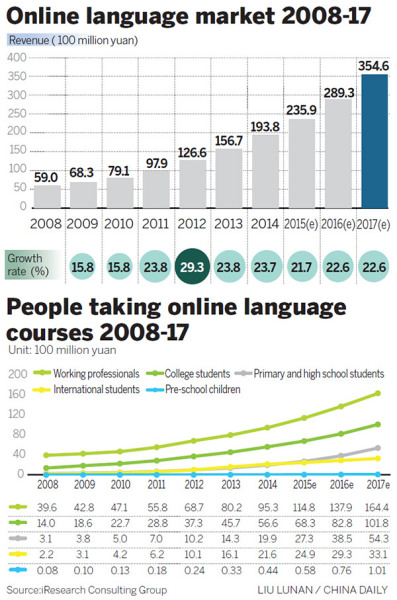Data released by iResearch Consulting Group, a market research company, showed that last year online language courses generated 19.38 billion yuan, an increase of 23.7 percent compared to 2013.
That figure is expected to grow by more than 20 percent annually and the industry is likely to be worth 35.46 billion yuan by 2017.
English language courses dominate the online sector with a 44.7 percent market share.
Next is Chinese on 28.7 percent, followed by Japanese and Korean on 16.6 percent, according to a market survey conducted by iResearch.
So far, hujiang.com, the online platform of New Oriental Education & Technology Group, VIPABC and, of course, 51Talk are the leading online English language schools.
Hujiang.com has developed a widely recognized brand among students in China.
Listed on the New York Stock Exchange in 2006, New Oriental Education & Technology Group has a long history of preparing students for exams required when studying abroad, such as TOFEL, or Test of English as a Foreign Language, and IELTS.
VIPABC is owned by TutorGroup, a leading Internet educational platform which was founded in 2004.
Last year, TutorGroup secured about $100 million in a second round of funding from Alibaba Group Holding Ltd, Singapore investment company Temasek and Qiming Venture Partners.
This was one of the largest investments made in an online educational service provider anywhere in the world.
"There is now fierce competition in the market and the industry is going through a transition with so many players," Zhu Zhu, an online English education researcher at Internet consultancy Analysys International in Beijing, said.
But Huang, of 51Talk, is convinced the key to surviving in a crowded marketplace is to provide a premium language learning experience to students at affordable prices.
Zhu went even further. Attracting more customers to these websites needs to become a priority as well as turning one-time users into registered clients.
Integrating online and offline educational resources is another major challenge as well as the "threat" posed by China's big three Internet firms.
"The direct competition from Internet giants such as BAT (Baidu Inc, Alibaba and Tencent Holdings Ltd) also poses a significant threat that these organizations cannot afford to neglect in the future," Zhu said.



















































